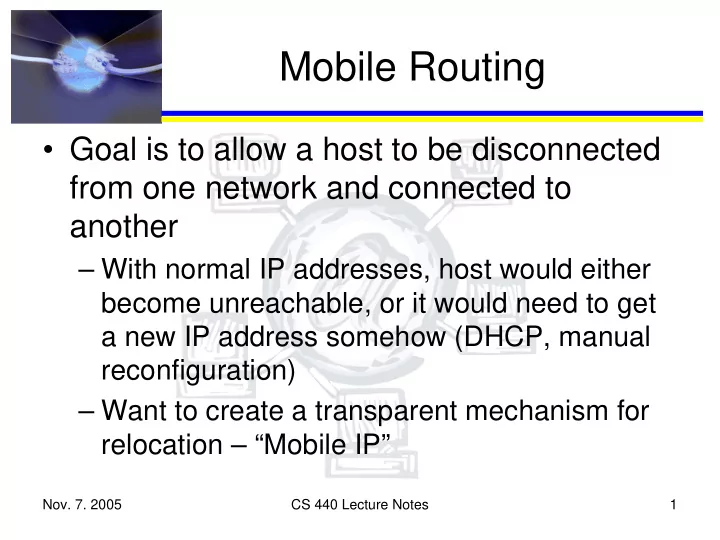

Mobile Routing • Goal is to allow a host to be disconnected from one network and connected to another – With normal IP addresses, host would either become unreachable, or it would need to get a new IP address somehow (DHCP, manual reconfiguration) – Want to create a transparent mechanism for relocation – “Mobile IP” Nov. 7. 2005 CS 440 Lecture Notes 1
Mobile IP • Mobile node assigned permanent home address • Add functionality to one router, the home router – Router attached to original, or home , network of mobile node (same network number as home address) – Serves as home agent for mobile node Nov. 7. 2005 CS 440 Lecture Notes 2
Mobile IP (cont.) • May also require foreign agent – second router attached to same network as mobile node • Agents advertise presence on network with agent advertisement messages – Mobile node may also solicit message when it attaches to a new network – Mobile node must learn address of home agent before it starts moving Nov. 7. 2005 CS 440 Lecture Notes 3
Mobile IP (cont.) • When mobile node attaches to network and receives agent advertisement, if the agent is a foreign agent, mobile node registers with agent – Mobile node supplies home agent address – Foreign agent contacts home agent and supplies care-of address (usually foreign agent’s IP address) Nov. 7. 2005 CS 440 Lecture Notes 4
Forwarding Messages • Home agent impersonates mobile node using proxy ARP – Sends out ARP messages with its own MAC address and mobile nodes home address, so other nodes on network think home agent is mobile node • Nodes send message to mobile node using permanent home address; home agent receives messages Nov. 7. 2005 CS 440 Lecture Notes 5
Forwarding Messages (cont.) • Home agent forwards message to foreign agent using IP tunneling • Foreign agent unwraps IP message, delivers to the MAC address of mobile node (recorded when mobile node registered on foreign network) Nov. 7. 2005 CS 440 Lecture Notes 6
Eliminating Foreign Agent • Mobile node can function as its own foreign agent, provided it can obtain an IP address on foreign network – Maybe use DHCP – Assigned IP address is used as care-of address • When mobile node sends, it puts its home address in source address; any replies are routed as described Nov. 7. 2005 CS 440 Lecture Notes 7
Route Optimization • Forwarding through home agent can be significant overhead – Suppose mobile node is talking to another node on the same foreign network; every packet to mobile node must go clear to home node and be sent back through IP tunnel to foreign agent – Referred to as “triangle routing problem” Nov. 7. 2005 CS 440 Lecture Notes 8
Route Optimization (cont.) • To resolve, let sending node know care-of address for mobile node – Sending node creates tunnel directly to foreign agent • Home agent sends binding update back to sending node when it forwards a packet – Requires special software in source node – If source understands, it can create entry in binding cache , use this to tunnel message next time it sends to mobile node Nov. 7. 2005 CS 440 Lecture Notes 9
Route Optimization (cont.) • Problem if binding caches become out of date when mobile node moves – Foreign agent can send binding warning if mobile node no longer on network – Sender then removes cache entry, goes back to sending through home agent – Only works if foreign agent is not mobile node • Related area – ad hoc networks Nov. 7. 2005 CS 440 Lecture Notes 10
Recommend
More recommend